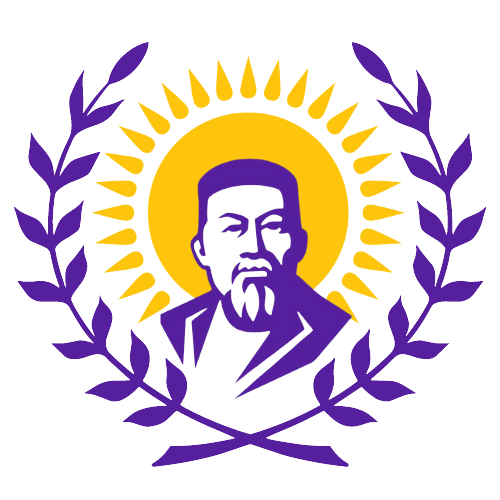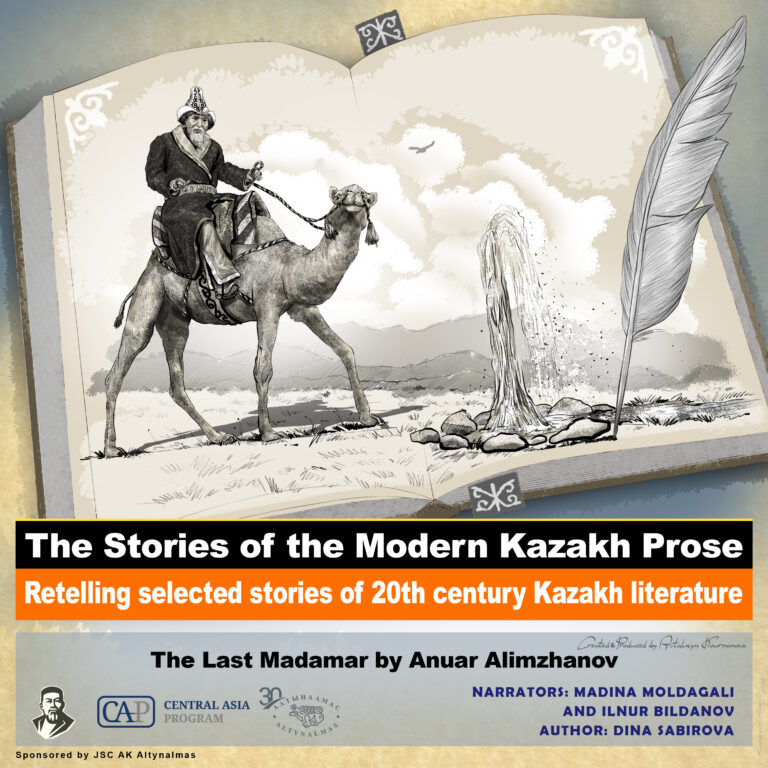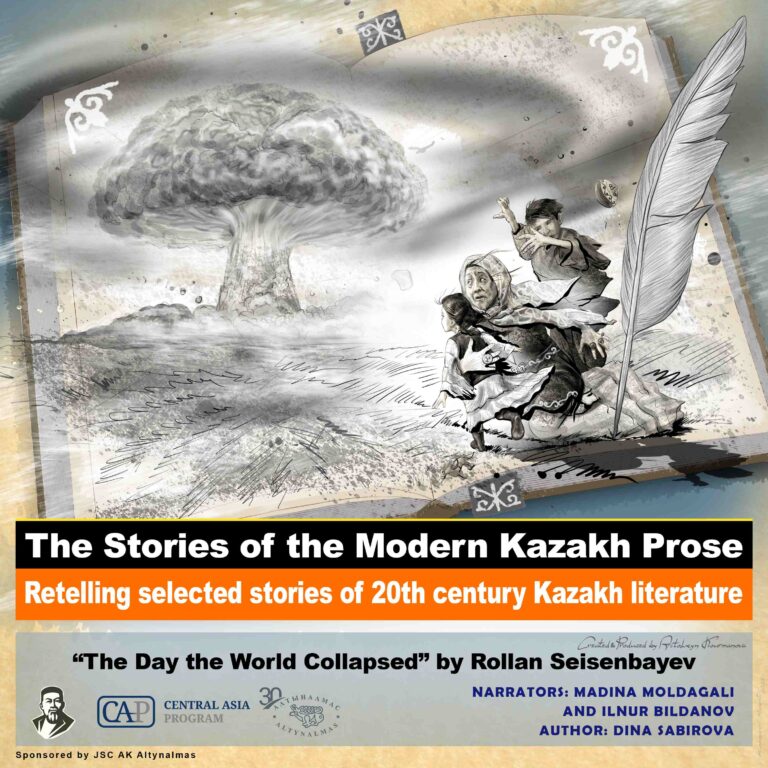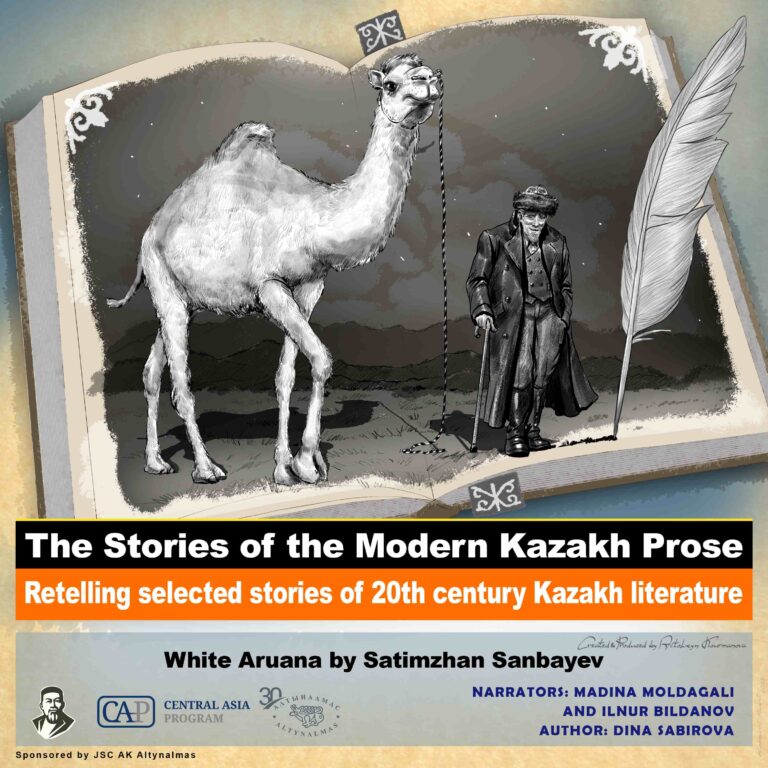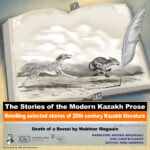
Mukhtar Magauin is a Kazakh writer, publicist, translator, and researcher of Kazakh folklore. In 1997, he received an international award from the Foundation of Artists and Writers of Turkey “for services to the Turkic world.” The award was presented to him by the then-President of the Republic of Turkey, Suleyman Demirel. Magauin translated into Kazakh a collection of selected stories by Somerset Maugham, as well as Henry Haggard’s novel King Solomon’s Mines.
In the story “Death of a Borzoi” Magauin uncovers latent rejection, hidden protest, and other social problems created during the sedentarization of the Kazakh steppe – all told through the eyes of a dog.
FULL TEXT
A feeble dog climbed up the hill in search of the scent of its master. He felt lonely and hurt without his human. He approached the mound, dragging his exhausted, pain-filled body along the ground and sniffing anew each time. Finally, the borzoi felt a sense of relief. His master was here, close by. His master was lying under this mound!
The borzoi thought about his childhood—how his master had managed to save him from a strange black dog that attacked him, had taken care of him and nursed him. The puppy, whom his master named Lashyn, had learned to divide people into two groups: his masters and strangers.
One day, a boy arrived: his master’s son, Adil, had returned from school. At the festive table, they started talking about the Tazy breeds of Kazakh greyhounds: borzoi. It turned out that Lashyn was a descendant of the famous borzoi Beskar. At the table, people talked about how the puppy would make a good hunting dog. It was a happy time for Lashyn. He played with Adil and ran in the steppe all day long.
Lashyn’s favorite pastime was catching the tail of a fox, which Adil had previously attached to a long stick and teased Lashyn with. The puppy and Adil were inseparable; sometimes the boy’s mother, Kamila, would even scold them for their mischievous games.
Outside the village, Lashyn was aware of a lot of smells and particularly the smell of a fox’s tail, which he wanted to pursue. Over the summer, the borzoi grew and started looking more like an adult dog. He was curious about the state of the things: Why did the horse, which was stronger than the man and could, when angry, destroy a fence, follow all the man’s orders? Similarly, why did a bull with horns, a scary camel, a neighbor’s dog all obey a man?
One day, Lashyn saw his long-time enemy, the black dog Bardasok, who had bitten him in childhood. Adil tried to protect his dog, hitting the black dog with a stone and causing him to run away. Lashyn was astonished: If such a small boy could defeat a terrible dog, what could adult men do? Lashyn became convinced that there was someone in this world who possessed mighty, invincible powers. By controlling those powers, he could do anything he wanted. And the owner of these powers was called man.
Adil returned to school and Lashyn was looked after by the boy’s father, Kazy. Over the fall, the greyhound grew stronger, while his owner brought many books home. With the first snow, his master took him out hunting; they saw many footprints in the snow. Lashyn smelled the fluffy tail of a fox, but his master held him back so as not to frighten the prey.
Once they drew closer, Kazy released the dog, who ran with all his might after the fox. Lashyn did not understand what he should do but ran instinctively after the prey. The further the fox ran, the angrier Lashyn became. When he finally caught the fox, he bit it and brought it to his owner, who hit the fox, leaving it lifeless on the ground. His master then praised Lashyn for a long time, which the dog really liked.
As Lashyn became a skilled hunting dog, everyone in the village was given a fox-fur hat. Soon, the borzoi was the talk of the region. One day, when Ķazy, who now coughed incessantly, had taken a draught of alcohol and lain down inside, covered in blankets, Lashyn met the same black dog that had crippled him as a child. He defeated him in a fight. Blood filled the borzoi’s eyes. Seeing nothing in front of him, he continued to strangle Bardasok. Only an unexpected blow made him come to his senses.
For a moment, it seemed to Lashyn that his spine had cracked, been broken in two—for Yesenzhol, Bardasok’s master, had kicked him with all his might with his steel-toed boot. Kazy, who had heard the sound of dogs fighting, jumped up and, limping, rushed out into the street to Yesenzhol.
“Hey, what are you beating my dog for?” he shouted.
“Beating it? Why, I’ll skin the hide off it!”
“The hide? Why, you… Who are you?”
“Ah, so you don’t know yet?” Yesenzhol laughed. “You’ll find out. I’ll make sure you do. You’ll go the way of your naġašy.”
“My naġašy’s got nothing to do with you,” said Ķazy, suddenly quietening down. “And don’t go threatening me. People say you can bend the truth, but you can’t break it. I spilled my blood. Everyone knows that. There!” Ķazy bent down slightly and slapped one palm against his wooden leg.
“Eh, sweetheart, we know all about goody-goodies like you! Angels with little wings, that’s all you are.” As Esenzhol’s voice rose higher, it started trembling, growing more and more agitated until it broke into a shout. “Do you think everyone’s gone blind and let their guard down? Not everyone! We have eyes and ears too! What kind of books are you collecting in that Ķyzylotau of yours? Eh? What kind of books are they, I say?”
“What do you mean, what kind of books? The kind that Soviet publishing houses publish.”
“They’re published by traitors like that naġašy of yours! You’re all cut from the same cloth… Do you think I don’t know what kind of books Yesenzhan’s son, the student, got from you this summer? All German and American. And what do you force on the people who can read here? Old books, old ones! Books that mourn for the past, they wrote about them in the newspapers! They should have been burned ages ago, but you keep them hidden away. Maybe you can tell me what for? Eh? Nothing to say? Say nothing, then. But honest people won’t keep quiet!”
“Shut your foul mouth, you despicable scum!” Ķazy exclaimed, grabbing Yesenzhol by the collar. Their neighbors had already crowded around them on all sides.
“There, you worthy people! Just look!” said Yesenzhol, raising his hands. “Just look! His borzoi tore my dog to pieces, and now he wants to kill me. You can bear witness!”
…Without any effort, Yesenzhol freed his collar from Ķazy’s unclenched fingers and pushed Ķazy away. He looked down at his enemy, who had collapsed awkwardly into the snow. “You miserable drunk!” he exclaimed abruptly, then snorted in disgust and walked away.
The master continued to drink, and everyone in the house was afraid of him when he was drunk. One day, the store ran out of alcohol. Kazy came home and when his wife began to scold him, Kazy unfastened his prosthetic leg and began to play the dombra.
He produced amazing music. In those melodies, Lashyn could almost smell grass and earth. The next day, they went hunting. At the beginning of the hunt, they encountered a hare, which Lashyn could not catch. Some time later, the dog smelled an unfamiliar smell. The tracks looked like those of a large dog, but the smell was of an enemy. After some time, he saw a gray dog-like figure in the distance. But the smell was different from the local dogs. Lashyn, operating on instinct, wanted to bite him in the throat and knock him over. But the enemy, a wolf, turned out to be strong. He managed to bite Lashyn on his side and tear off a hunk of the dog’s flesh.
But in the heat of the fight, Lashyn did not even notice this. In the end, the victory went to Lashyn; he brought the beast to his master.
After this kill, Lashyn required lengthy treatment. His master, too, fell ill and he was taken away in an unknown car. When he finally returned home, Master Kazy was much thinner and had a persistent cough.
One day, Kazy did not wake up. The dog did not understand what was happening, but the master’s body was taken away to a distant mountain. In vain, Lashyn waited for him to come back. Adil came home from school, but he was a changed person, grumpy and unsmiling; Kazy’s wife cried all day long. Lashyn felt lonely as never before—he went unfed for several days at a time. But his pride did not allow him to forage from trash cans. Sometimes he would feed on wild mice.
One night, quietly knocking on the window, the hated Yesenzhol came and put some alcohol on the table. His master’s wife welcomed him and they both retired to another room. Lashyn heard strange noises, as if Yesenzhol was strangling the mistress. He ran in and bit Yesenzhol on the rear. His master’s wife kicked him out of the house.
Lashyn had never lived on the street, which meant that he was even sadder. One day, when the first snow fell, Lashyn, out of habit, ran outside the village in the hope that the master would return and they would go hunting. When he caught a fox, he felt incredible loneliness: there was no master to whom to bring this prey. Lashyn decided to run to his master’s grave and bring him the fox. Along the way, Lashyn came across a trap that had been forgotten by hunters. The dog injured his paw; it bled profusely. After suffering for several days, Lashyn crawled to his master’s grave and died there.
***
Mukhtar Magauin wrote this story through the eyes of a dog. It tells the life story of a dog, its struggles, and its relations with others (people, other animals, and nature as a whole). Yet the dog is part of the national social story: it is not a coincidence that he is one of the last purebred Tazy, a product of Kazakh dog-breeding, a part of Kazakh culture that was attacked during collectivization. As such, the borzoi Lashyn represents the unbroken part of the Kazakh spirit. While humans move away from their roots in the process of rapid Soviet modernization, animals particularly Kazakh animals seem to be the last bastion holding on to the native ways of life.
